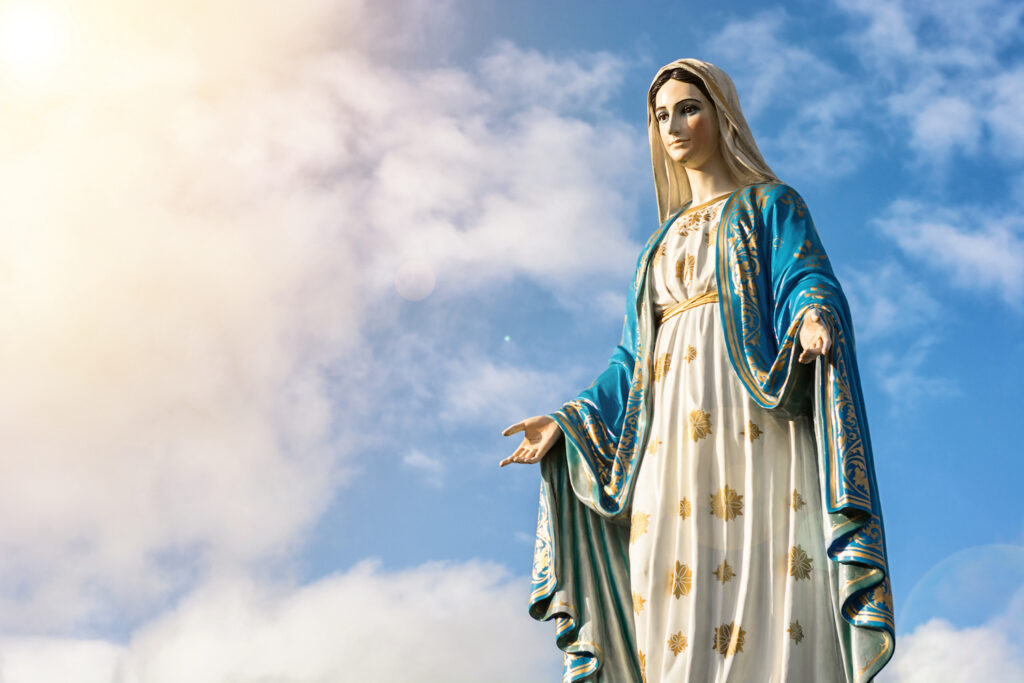Most Catholics associate the month of May with Mary, Mother of God, but few know that May was originally the month devoted to Maia, Greek goddess of fertility. In A.D. 313, Constantine issued the Edict of Milan, legalizing Christianity. In A.D. 380, it became the state religion of the Roman Empire.
Along the way, many pagan holidays and symbols were converted to represent Christianity, and since Mary’s motherhood extends to all people, changing May to represent Mary was a logical transition. For today’s Catholics, this month has become synonymous with May altars, Marian hymns and May crowning.
It’s also the month when the Church celebrates the feast of the Ascension of our Lord into heaven, causing me to wonder what was in Mary’s heart when she watched her son lifted, knowing that she would not see him again until after she died.
What was her experience during the month that followed her son’s death as she watched the apostles set forth to carry on the mission that Jesus had begun? What were her thoughts as she watched the Church experience growing pains that included persecutions and martyrdom? Almost overnight, her mission was expanded from being the mother of Jesus to mother of the entire world.
Having recently celebrated the Solemnity of the Resurrection of our Lord amid strains of alleluias, these aren’t typical questions that occupy the minds of most Catholics during May. And yet, I suspect that for many who have lost a loved one during these past months, Mary’s sorrow is closer to their heart and their lived experience than rejoicing.
During the months following Jesus’ death and his ascension into heaven, Mary’s memories of Jesus’ life on earth surely occupied her mind and heart. She knew that her son was in heaven and that she would see him again, yet she surely longed to embrace him just as everyone who mourns a dead son, mother, father, sister or brother does. Mary’s human experience is what makes her real to us.
She was not God, and although she loved God with all her heart, she surely missed her son, savoring his every word. After Jesus’ ascension, Mary was a woman wrapped in silence, pondering divine mysteries within the context of the human experience.
No longer an ordinary Jewish mother, Mary became mother to persons of every race and religion. She is esteemed by Muslims as mother of the greatest prophet next to Mohammed, and respected by Jews as mother of a wise teacher.
According to Roy Schoeman, Harvard professor and self-proclaimed atheist, Mary appeared to him and changed his life. He is now a Catholic, attends Mass daily and witnesses to the extraordinary beauty of the Mother of God.
During these times when there is so much tension and a lack of appreciation for diversity, we do well to remember that Mary is mother of all people.
I recall a mother of seven children was once asked if she had a favorite among her children. Her response was that on any given day, the one who is suffering most was closest to her heart. I believe Mary would say the same of her children as she looks upon our broken world.
The poor, the suffering, victims and refugees of war and violence, those who have lost a loved one, are surely close to Mary’s heart. Having suffered much in her life on earth, she is no stranger to pain. And yet, as any loving mother would, she binds wounds, soothes aching hearts and entrusts her children to Jesus, divine healer and redeemer of the world.
Despite Mary’s exalted position as the Mother of God, spiritual author Caryll Houselander reminds us that “Mary was not asked to do anything herself, but to let something be done to her. She was not asked to renounce anything, but to receive an incredible gift. She was not asked to lead a special kind of life, to retire to the temple and live as a nun, to cultivate suitable virtues or claim special privileges.
“She was simply to remain in the world, to go forward with her marriage to Joseph, to live the life of an artisan’s wife, just what she had planned to do when she had no idea that anything out of the ordinary would ever happen to her.”
Mary reminds us that it’s not what we do that is important, but the love that accompanies ordinary tasks that are part of our life’s vocation. Mary is more than mother; she is model, teacher and intercessor, and so we pray, “O Mary. conceived without sin, pray for us who have recourse to thee!”
Barbara Hughes is an author, retreat facilitator and spiritual guide. She lives in Virginia Beach and can be reached at [email protected].

